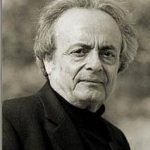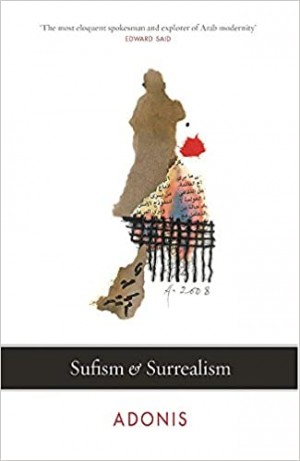The author's book "Prophecy Ye Blind One" was our book club selection for January 2008.
Find more information on the book, its author and readers' discussion on the book's page.
Adonis (Ali Ahmad Said)
Described as one of the leading poets of the Arab world and one of its "best-known intellectuals and critics," the Syrian-Lebanese poet, Adonis, is renowned not only as an innovative poet and the forerunner of poetic modernism in the Arab world, but also as literary critic, essayist, editor of anthologies, and translator. He has been a leading voice in Arab poetry and culture for five decades, and is considered by many as the most influential modern Arab poet, very much in the vanguard of what has been called "the revolution of the 'New Poets'".
Ali Ahmed Said grew up in the small town of Qassibin, near Latakia, in Syria. As a boy he often worked in the fields, but his father, a student of Arab culture and Islamic theology, ensured his immersion in Arab poetry, and by age 14, he was already penning his own verses. He may have chosen the pen name Adonis in order to improve his chances of publication, but probably with full understanding of the mythical and cultural implications of fertility, resurrection, and spiritual renewal implied in the pagan god's legacy. Following early schooling in Tartus, the poet studied law and philosophy at the University of Damascus. While serving in the Syrian army, he was briefly imprisoned for his political views, and in 1956 he chose exile in Lebanon, becoming a Lebanese citizen four years later.
During these years of exile in Beirut Adonis was writing poetry and immersing himself in the local literary scene. First Poems appeared in 1957 and Leaves in the Wind in 1958. The work often perceived as his most lyrical, his masterpiece Aghani Mihyar al-Dimashqi (Songs of Mihyar the Damascene), was published in 1961. Between 1956 and 1963 he coedited, with his friend Lebanese poet Yusuf al-Khal, the avant-garde magazine Shi'r, an influential poetry journal which championed new poetic forms and introduced modern ideas about Arabic poetry. He later founded and edited his own journal of poetic modernism, Mawaqif (Positions), which promoted new subjects and new language for poetry. In 1960-61 he spent a year in Paris on a French government scholarship. While teaching Arabic literature at the Lebanese University (1970-85), he obtained his doctorat d'état from St. Joseph's University in 1973 (his dissertation, "The Static and Dynamic in Arabic Culture") and was in 1976 visiting professor at Damascus University. He has lectured at the College de France in Paris, the University Censier Paris III, the University of Geneva, Georgetown University in Washington, DC, and Dartmouth College in New Hampshire. He has several times been visiting professor at such places as Princeton University and the Institute of Advanced Studies in Berlin. Today he lives in Paris, but returns frequently to Beirut and Syria.
Adonis has focused on Arab culture and Arab poetic traditions. Gradually poetic statements of his political and social views developed into a search for self-identity, national identity, and future hope for Arab society and culture. He shunned direct statement and wrote in ever more complicated metaphor. His social concerns, aspirations for Arab society, and hope for universal reform, sought expression in language change. According to biographer Kamal Abu Deeb, Adonis's poetry seeks to "change the world and to bring about a fundamental transformation of language".
In an essay called "The Time for Poetry" (1972), Adonis defined the New Poetry as "a change in the order of things and in the way of looking at them". The New Poetry, he wrote, "appears to be a rebellion against the forms and methods of old poetry, a rejection of its attitudes and styles which have outlived their usefulness". The New Poetry concerns itself with a "metaphysical sensitivity ... which cannot be apprehended by reason and logic but by imagination and dreams ... New Poetry is the metaphysics of human existence". The New Poetry thus has to make use of new language, and Adonis experimented adventurously with new syntax, new metaphors, and new structures.
Adonis abandoned traditional forms and harmonies for a natural meter, saying poetry arises from "an inner harmony". For him the language of the New Poetry is "made to say what it has not been taught to say," and provides "an immediate apprehension of inner truth". In the poetry of Adonis language and ideas fuse together in a technique called "tarab," which "aims at a sort of ecstasy reached when the musicality of the verse corresponds with the visions and thoughts expressed in the poem". In capturing the illogical absurdity of modern life, the New Poetry abandons logical order and encompasses ostensibly meaningless imagery and sometimes obscure symbols. Frequently charged with unintelligibility in his later poetry, Adonis acknowledged the difficulty and said, "It is not necessary to fully understand poetry in order to enjoy it".
Often described as a poet of revolution and rebellion, Adonis is passionate about the future of the Arab world. In a recent interview Adonis said that modern Arabs face the world with old ideas from an obsolete context. "We must sever ourselves completely from that context, on all levels, and think of a new Arab identity, a new culture, and a new Arab society". Young admirers of Adonis are sometimes known as "the Adonisian school". Syracuse University professor, Shawkat Toorawa, said Adonis offered his students "a way, sometimes new, sometimes just newly formulated, of thinking about self, world, language, and commitment".
An outspoken critic of modern society, Adonis harshly rejected dehumanizing aspects of American materialism in a prose poem about New York written in 1971. "A Tomb for New York," the poem, while directly addressing people such as Walt Whitman and Abraham Lincoln, recorded the poet's reaction to Harlem, Wall Street, and American policies in Vietnam and the Middle East.
New York, a woman, the statue of a woman holding in one hand a rag called liberty by papers we call history and with the other hand strangling a child called the Earth. (II, 647)
Adonis remained resolutely tied to the realities of everyday life. On the day of the United States invasion of Iraq, a poem by Adonis appeared on the front page of an Arabic newspaper.
Although often overtly pessimistic in his outlook, in "Beyond East/West: Towards a Culture of the Future," a lecture delivered at Dartmouth College in 2001, Adonis seemed to express hope in the future, while continuing to reject twentieth-century materialism and technology. Reflecting Sufi thought, he envisions a perfect human in a creative movement evolving toward universalism. In words recalling his own life of exile, he wrote, "For between rootedness and uprootedness, between the country of birth and the country of migration, between alienation in the homeland of the self and exile in the homeland of the Other, creativity ... finds expression." An art which transcends "political-national borders" will "assume a universal scope".
Adonis has received numerous honors and awards for his poetry: the first ever International Nâzim Hikmet Poetry Award, the Syria-Lebanon Best Poet Award, the highest award of the International Poem Biennial in Brussels, and the Goethe Medal of the Goethe-Gesellschaft. In 1983 he was elected Stephan Mallarme Academy Member in Paris, and in 1986 he was an honorary guest of the Pen Club meeting in New York and nominated Permanent Assistant Delegate of the Arab League at UNESCO. He has several times been mentioned as a candidate for the Nobel Prize for literature
source: AUB






